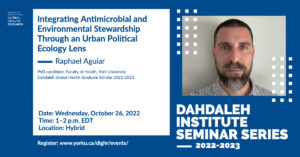Post
Published on October 31, 2022

On October 26, Raphael Aguiar presented a guiding framework that focuses on rescaling socio-ecological governance approaches to addressing AMR by considering societal relations with nature that affect AMR at the human-animal-environmental interface. Antimicrobial resistance, pandemics, biodiversity loss, and climate change pose simultaneous existential threats, yet coordinated responses that jointly address them through a One Health approach do not exist. An urban political ecology (UPE) lens informs a critical analysis of the governance of antimicrobial stewardship (AMR) by situating AMR risks in relation to global governance and economic forces that shape the social and political co-determinants of antimicrobial and other systemic existential threats already confronted in broader commitments to pandemic prevention and environmental stewardship.
Watch the seminar presentation below:
Themes | Global Health Foresighting |
Status | Active |
Related Work |
N/A
|
Updates |
N/A
|
People |
You may also be interested in...
Five York Researchers Awarded Seed Grants for Critical Perspectives in Global Health Research
Five York researchers have been awarded seed grants to carry out critical global health research and develop fuller grant proposals and research programs. Following a two-day workshop on critical perspectives in global health research in ...Read more about this Post
Publication: How COVID-19 Lockdown Measures — and Their Outcomes — Varied in Cities Around the World
Dahdaleh Institute Faculty Fellow Roger Keil and his colleagues have been studying the disparate responses to COVID-19 in Johannesburg, Toronto, and Chicago. Their recent publication in The Conversation describes the impacts of different public health ...Read more about this Post
Recap – The Protection Gaps that Venezuelan LGBTQI+ Asylum Seekers Face in Brazil
On October 19, the Dahdaleh Institute for Global Health Research and the Centre for Research in Latin America and the Caribbean co-sponsored a seminar with Yvonne Su (faculty fellow) and Gerson Scheidweiler (postdoctoral fellow). Yvonne and ...Read more about this Post
